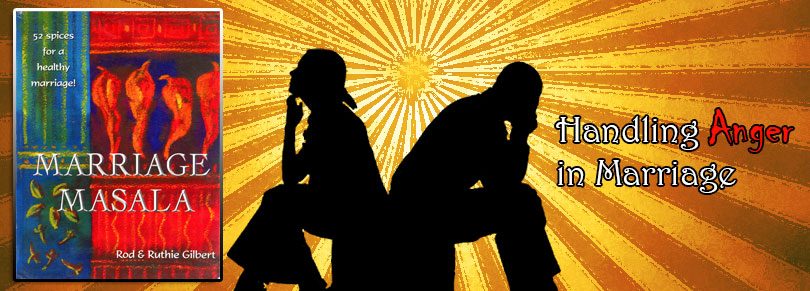What is the easiest thing to get and the hardest thing to get rid of?’
someone said it is ANGER.
Anger – Creative and Powerful
Anger is an emotion and like all other emotions, it is needed for our well-being and is there for a purpose. Surprisingly anger can be a creative powerful emotion to bring about what is right and good in the world. Slavery, bonded labour, ill-treatment of women, child abuse, etc., are issues we must burn with anger about and work against. Our anger helps us be protective and work for a better world. We are angry with our children if they tell a lie or touch an iron when it is hot. Our anger protects. We are angry when a government official demands bribe. Our anger works for justice.
Nonetheless, do you often feel you are a lousy couple because you are often getting angry with each other? So what is the problem?
How we express our anger
The problem is often the way we express our anger. We can express anger constructively or destructively. For example, getting angry with a person for doing something wrong is just but using violence in expressing that anger is destructive. So what we do with the emotion called anger, how it shows up in our behavior and thought life is the key. We can use anger constructively for the betterment of all involved in a way that treats ourselves and the other person with dignity and respect or we can use it destructively to tear down people and worsen relationships and situations.
Just and Unjust Anger
Anger can start by being just and quickly move to becoming unjust anger. You can get angry with your spouse for being late to an event that is important for the whole family. But then you can soon progress to unjust anger when you think ‘how will others look at me if I walk in late? I will pay him back and make sure he never forgets this.’ Soon you start attacking him and labeling him saying ‘you are good for nothing’ ‘you are a loser’ and talk badly about him in front of others—that becomes unjust anger.
What is Just and Constructive Anger?
1. Unselfish:
Just anger is directed towards suffering of others not self. There is a thin line between the two.For example, it is out of just anger that I ground a child for telling a lie, because you want him/her to be a truthful person. However, lurking in the back of my action could be the thought, ‘what will other people think of me as a parent if my child lies.’ If I allow this thought to take hold of me then my anger will soon become unjust and destructive. Then I will say things like ‘I don’t want to have a child who tells lies’or ‘I am ashamed of you as my daughter’.
2. Controlled:
How often our anger flares out of control? We say things we do not mean and we do things we otherwise would never do. We are far more likely to lose control when the person we are angry with is emotionally involved with us. So our spouse, children or parents bear the brunt of our uncontrolled anger. Anger is usually controlled when it is with people outside. Uncontrolled anger can be noisy like slamming doors, shouting, making a big scene. It can also be as silent as death showing no outward sign, but uncontrolled in our thoughts against the other person. We can murder a person in our thought life with uncontrolled anger and hold, unforgiveness, bitterness and grudge. This too is equally harmful for us and the marriage.
3. Directed towards the problem not the person:
The anger we have should be directed at the problem not the person. We are on the same team and not fighting each other. We have to together solve the problem or fight the battles of life. A while back we met a couple where the husband was frequently talking about his wife as untidy and unorganized. She felt demeaned and devalued as a person. His anger was directed at her, not at the specific problem of an untidy or unorganized house. Such anger can never build up a person, but always destroys them. If they both could sit together and creatively see what can be done to be more tidy or organized and how he can help her in that, she would be built up and their relationship would be strengthened.
4. Seeking Resolution not revenge:
Think back at the last time you were angry with your husband or wife. How did you pay them back? Did you withdraw your love; turn your back on him/her; did you silently sulk and not respond to their attempts at conversation? We often want to seek revenge when we are angry in our own subtle ways. But we often lose the relationship in n the process. Let us seek resolution to the problem rather than revenge. If you are upset with your spouse for forgetting your anniversary, talk to him about how you feel and see how you can help him remember rather than spoiling the whole day or week in seeking
to pay back hurt and disappointment in kind.
Ask ‘why I am angry’ and ‘how do I constructively express it’.
One of the most helpful questions to ask in order to break the vicious cycle of unjust anger that is selfish and destructive is to ask yourself – WHY?
Why am I so angry?
Why did I react like this?
Why am I expressing my feelings like this?
This is a way to break repeating cycles of unhealthy patterns that seem inevitable. Let us intentionally address our anger and express it creatively to build a healthy marriage and family.
Spice it up: Make a list together of the things that have made you angry this week. Think Why? Is it time to let go of unjust anger and ask forgiveness or extend forgiveness? Is there any creative action you can take to turn your anger on the problem and make way for positive change?
Adapted from Rod and Ruthie Gilbert’s book ‘Marriage Masala, a book of ‘52 spices’ to make good marriages healthier. It is a collection of creative ideas offered to couples to improve the flavour of their marriage.





